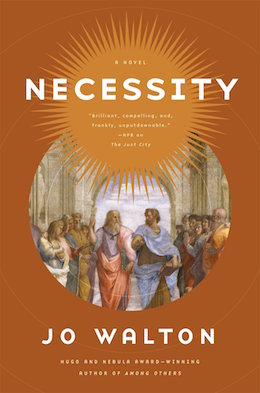δεῖ δὲ καὶ τὰ δι᾽ ἀνάγκης γιγνόμενα τῷ λόγῳ παραθέσθαι
And it is needful to provide an account of the things which, through necessity, have come to be.–Plato, Timaeus, 47e.
Plato’s Timaeus is a philosophical dialogue about cosmogeny—how the universe came to be. It talks of causes, of the nature of sameness and difference, the existence of a singular divine motivating force which causes other things to come to be, a “Craftsman” (δημιουργός), the constitution of the spirit (ψυχή) and the constitution of the world, moon, sun and stars, the nature of forms (ἰδέα in the singular), and the workings of necessity (ἀνάγκη), among other things. It’s widely held as Plato’s least accessible work, and one of his most theoretical.
Its influence on Jo Walton’s Necessity, third and final book in the trilogy that began with The Just City and continued in The Philosopher Kings, will be plain to any reader who has ever struggled through the strained English of a translation from the Timaeus’s turgid philosophical Greek—if perhaps a little less obvious than the influence of the Republic on The Just City.
Before I continue my discourse upon Necessity, a word of warning: this novel will make very little sense to anyone who hasn’t read the previous two. (This is often the way with trilogies, even trilogies where, as here, each of the constituent volumes forms a single discrete narrative of its own.) But Necessity adds its own challenges: this capstone volume adds aliens, extra-planetary travel, paradox and determinism, and (re)contact with the rest of humanity to Platonic philosophy, Greek gods, time travel, and sentient robots. Walton’s science fiction of Platonic philosophy isn’t going to slow down for anyone…
More than a generation has passed since Zeus relocated the original Just City and its daughter cities in space and time, to the planet they call Plato and the twenty-sixth century of the common era. In that time the inhabitants of the planet Plato have been visited by two alien species with whom they conduct trade; members of the second alien species live in the cities as citizens and philosophers. The god Apollo has lived among them as a mortal, and his children have come to adulthood and had children and grandchildren of their own. Necessity opens on the same day as Apollo’s mortal life as Pytheas ends, the same day that a spaceship arrives from the rest of the human race.
Another book would make this recontact—this encounter between cultures who possess very different values—its centrepiece. But Necessity’s central problem—its driving force—is the disappearance of the goddess Athena into the Chaos outside space and time, and the riddle she set for Apollo to find her again—a riddle which must be solved. Part of these events, or reflecting upon them, are five characters who provide us with a viewpoints on the narrative: Jason, a fisherman; Marsilia, one of the city’s philosopher-rulers; Thetis, her sister, who raises children; Apollo himself; and the robot-philosopher-artist Crocus. Central to events, even if they do not speak in their own voices, are the young alien Hilfa, who crews on Jason’s ship and who came to be out of mysterious circumstances, and the alien trickster god—god also of wisdom and riddles—Jathery.
That might be Necessity’s central problem. But its central theme is an argument about the nature of the universe, the nature of gods, and the nature of souls—and the nature and function of society as well, calling David Hume’s On Liberty and Necessity to mind as well as the Timaeus. It’s also a book about family, knowledge, and the interrelationship between Chance and Fate: between Freedom, so to speak, and Necessity.
It’s a peculiar thing, to read this trilogy—and particularly this, its capstone volume—as a classical or ancient historian. The Just City and its sequels are an exercise in imagining eutopia: Walton’s interpretation of Plato’s Republic (an aristocracy: the rule of the best over the inferior) is a charitable one, as is her contention that the philosophers of any such city would reject slavery entirely and support complete gender equality. It is an idealised version of Platonic philosophy — for Plato’s political philosophy explicitly reflects the anti-democratic strain in ancient Greek political thought, a strain that sees some individuals as inherently better and more worthy than others. It is faintly distressing, in fact, that Walton does not carry The Just City’s argument about equal significance and volition through the trilogy entire, and measure it against the contradiction inherent in not granting the citizens of these imagined eutopias equal significance and equal right to participate in political life.
But that, then, has always been one of the pleasures of these books: the ability to enjoy them while mentally arguing over all the things they are WRONG about, from a philosophical-political point of view; and from an ontological or an epistemological or a teleological point of view. Like the philosophical dialogues from which Walton has so explicitly drawn her inspiration, with these novels, the argument is itself the point.
Necessity, like its predecessors, won’t be for everyone. Its structure is less tightly focussed that its predecessors, though its characters and voice are equally charming. But if you enjoyed The Just City and The Philosopher Kings, then you’ll almost certainly enjoy Necessity too.
And enjoy arguing with it.
Necessity is available now from Tor Books.
Read an excerpt from the novel here on Tor.com.
Liz Bourke is a cranky person who reads books. She holds a Ph.D. in Classics from Trinity College, Dublin. Find her at her blog. Or her Twitter.










